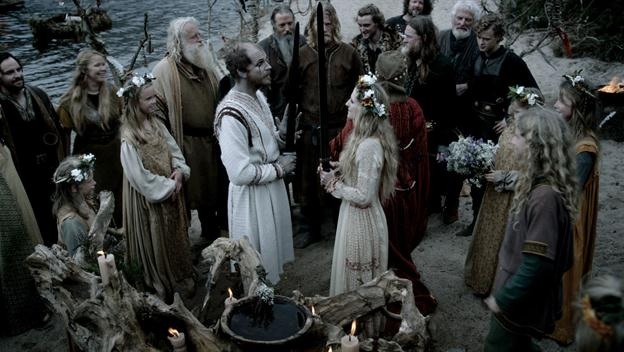Vikings, Season 2, Episode 7, “Blood Eagle”
Written by Michael Hirst
Directed by Kari Skogland
Airs Thursdays at 10pm EST on History
Ragnar — who is so ill-inclined to violent acts unless they serve a purpose — opens tonight’s offering by killing and skinning a rat. It’s our first look at the new gears he’ll be settling into; those being of a political ingenuity which is new for the age. Still, the insistence upon drawing in mythological aspects mar the otherwise crystalline set up of Ragnar’s major rivalries and other minor character conflicts: what is the point of investing ourselves in the bruises or pitstops our heroes must grapple with, should their paths already be preordained? The animals which populate the screen tonight don’t fall into either categories of frustratingly explicit or string-pulling metaphor, however: they at least serve as easily-understood doubles for some of the onscreen cast.
So then, the rat.
For reasons of economy alone, it seems best suited that all of Ragnar’s enemies are grouped into the notion of the rat alone. Horik — and now Siggy — seem best suited to the position of primary rat alone: it’s been stressed in the past how very much Ragnar values fealty and loyalty, and to have two of his companions-cum-“allies” plot against him, while ambiguously in his midst, is a devastating (but inevitable) reality check. Once again, I can’t help but feel Horik’s conviction is lacking; and that it’s shrewd-eyed Siggy who carries much of the weight of this plot, no matter that she’s required to minister affections to both Rollo and Horik. (Standen checks Rollo’s rapid swings in emotion and mood, from “wise sage” state to “furrowed brow, flying fists” warrior place wisely: much less or much more would undercut the tempestuous nature he brings to the fore here. Still, it’s hard to justify his sudden possessiveness over Siggy, given that it’s been Siggy herself who’s attached herself to him; and he in turn, who’s seemed little of the clingy or over-aware-of-her-other-inclinations type.)
But these longstanding conflicts aren’t the show’s primary prey tonight. Rather, as if suddenly, violently aware of Floki’s more endearing qualities, the showwriters have pitted him against perennial (and necessary) favourite Ragnar. “Why not?” seems to be the official line of reasoning taken with this approach, and little more than that. I’m tempted to give them the benefit of the doubt and nail this sudden character transformation to Floki’s inherently unknowable nature along with the possibility of this being a long con against Horik, but still, his mentions of having played “the fool” speak of a self-awareness we’ve only skimmed the surface of before. Play the fool as he may, it’s the fools that are often privy to more private conversations or plans; and the fools that more often capable of calculating and preying upon their leader’s weaknesses, as opposed to explicitly stating said leader’s faults faults — of which Floki (and the writers) struggle to detail or touch upon, furthering my belief that this evolution’s unsubstantiated — while sharpening their own talons. (On that point: Skarsgård could nail a model of Floki that was both cannier and critical of himself.) Certainly, it gifts us with a rare opportunity to glimpse his inner psyche, but I’d much rather these moments be similar to the revelatory, emotion-tinged turn he took a few weeks back, in which he revealed his fear the gods were against them. This Floki is no less tethered to emotional or esoteric interests — which we’ll touch upon later — but he seems somehow diminished to be placed so squarely in the foreground for this, with such bitter stakes at play, as opposed to what could’ve been some truly fascinating reflexive analysis on his new position.
I’ll be keeping an eye on this for further developments. Again, I’m happy to give the writers some space to play here. No matter that Floki’s turn is left-of-field and laid on thick, there are still arguments to be made as to why this motivation’s been cloaked or ignored in past episodes: Jarl Borg and Ecbert demanding much of our attentionin the past, for one, or Floki’s preference and habit of floating on the sidelines; the writers interest in ensuring even the most tricksy of characters remains fleshed-out-with-flaws to complement his new status anxiety, for another. Besides, as I might’ve said before — and will certainly do so again — some of Ragnar’s best adversaries have come from those closest to him in temperament, locale, or relationship, as opposed to those removed from him by location or interest.
Speaking of character beats, it’s also unusual to see Ragnar stewing over something to which forethought and predictions need not be placed — one expects him to muster the resolve to go ahead with Borg’s execution far sooner than he does. At best, Fimmel’s tempered Ragnar’s reticence which a transcendent clarity which indicates something’s brewing in the lord’s mind, even if we can’t guess at what. Part of this could be attributed to the way those who owe him fealty — who are seen, neatly fractured into their respective couples and plotting-couples in one particularly smart shot — appear to be drifting; and Floki’s slight can hardly help this mindset, either. Lagertha’s reappearance is the one note that seems to lift this, and it’s a pleasure to see her back on (accepted) equal grounds with her ex-husband.
To say much more of the episode would be to ruin its central delight, though: that of the inevitable execution of Jarl Borg. It would be better to leave at this: both alike and unlike other period shows in the way its most significant sets of violence take their time to build, the central ritual-slash-hanging is something else entirely. Beautiful — if such a word should be used. Transcendent. Merciless.


